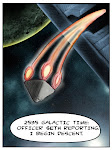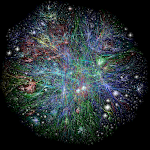Key words: M. Night Shyamalan, authors, Hitchcock, criticism, critics
M. Night Shyamalan is one of the most curious, imaginative and stylish filmmakers of current American mainstream cinema. Throughout his filmography he shows himself as an expert narrator of fantastic, neat, short stories with carefully delineated plots and perfect endings[1]. He adds to this a rare awareness of the grammar of films. Such is his usage of narrative devices, that he could be easily found an oddity, at least within commercial standards.
From the very beginning, I was one of the many who found a resemblance to Hitchcock’s cinematic language. Jeet Thayil put it this way: “Like Hitchcock, Shyamalan is in express control of his tools. He uses music, sound and expert manipulation of human psychology.” Michael Agger would add “the point-of-view editing, the emotional close-ups of actors, the fixation on detail, and the eerie score,” together with a compliance with Hitchcock's definition of terror: "If you want the audience to feel the suspense, show them the bomb underneath the table."
 Curiously, Shyamalan’s ties to Hitchcock’s style do not seem to have acted as a shield from the critics’ attacks. Even those who acknowledge his utter dexterity with films charge against him with violence and contempt. Personally, I understand Agger makes a point when he accuses M. Night’s films of being “fragile, sealed-off movies that [fall] apart when exposed to outside logic.” I think it’s just so, provided you do away with the ‘fragile’ qualifier.
Curiously, Shyamalan’s ties to Hitchcock’s style do not seem to have acted as a shield from the critics’ attacks. Even those who acknowledge his utter dexterity with films charge against him with violence and contempt. Personally, I understand Agger makes a point when he accuses M. Night’s films of being “fragile, sealed-off movies that [fall] apart when exposed to outside logic.” I think it’s just so, provided you do away with the ‘fragile’ qualifier.
Shyamalan’s films are soundly structured -every line, every element, proving crucial to the final development of the plot. However, it is true that they all have a logic of their own that works only when the film is running. The important thing is that it does work when the film is running. Even when seeing Shyamalan’s films for the second time, even after having already exposed his plots to a killing ‘outside logic,’ the films prove catching, thrilling and sensible again.
In this sense I find Shyamalan’s films have the logic of dreams, which prove moving and effective until we wake up and rationally dissect them. But again we dream, and again we believe what is impossible under other conditions. Fantasy itself calls for some rational withdrawal. Sometimes also cinema does[2].
On the other hand, I’ve got the impression that some critics’ attacks on Shyamalan do nothing but show their own –perhaps unconscious- attraction towards his films. Some arguments against his work look as if the critics were pretending from the filmmaker more than he can really give. This pretension implies a hidden liking of his work. They see and understand that Shyamalan is an expert and creative director –they even compare him with Hitchcock- so they ask him an ambiguously defined “Cinema” (with capital letters) that perhaps he’s not able to give. He’s no more –and so far no less- than a creator of little, suggestive, fantasy stories for the mainstream taste. Critics seem to even forget that Hitchcock himself furnished a name and a legend by filming a majority of dull, conventional arguments. It’s just that Hitchcock filmed expertly, and, from time to time, gave birth to an incredible masterpiece. What would critics say if M. Night brought us another The Sixth Sense?
 Nowadays, The Sixth Sense (1999) seems to have become the critics’ reference point when approaching any of Shyamalan’s later films. The problem is that even critics appear to have liked that film so much that they are frustrated when new Shyamalan’s attempts prove unable to retrieve the original thrill experienced with it. People like Agger, when questioning the author’s last films, seem to forget that The Sixth Sense contains the same logical problems than all of M. Night’s other films. Perhaps they were so involved with the plot that they didn’t realise it. Or perhaps, since the author was not yet famous, they decided to by-pass it.
Nowadays, The Sixth Sense (1999) seems to have become the critics’ reference point when approaching any of Shyamalan’s later films. The problem is that even critics appear to have liked that film so much that they are frustrated when new Shyamalan’s attempts prove unable to retrieve the original thrill experienced with it. People like Agger, when questioning the author’s last films, seem to forget that The Sixth Sense contains the same logical problems than all of M. Night’s other films. Perhaps they were so involved with the plot that they didn’t realise it. Or perhaps, since the author was not yet famous, they decided to by-pass it.
I think the soundest criticism comes from those who question the author’s trademark ‘twist endings’. It is true that I do not see ‘twists’ in Shyamalan’s endings. A twist makes reference to a surprising sudden change of direction in the plot. Instead, I find Shyamalan’s films are structured as multiple lines that logically converge in a single final point where their true meaning is realized. So there is no sudden change, but logical realization. How surprising this realization can be seems to be the problem with the later films. And this is the product of redundancy, the problem derived from resorting to the same narrative structure film after film. Here is where I agree M. Night is facing a weakening point. His problem –being an author who always attempts at surprising- seems to be that you cannot really surprise the audience when the audience is waiting for a surprise, and knows exactly when and of what kind it will be. But this is a minor problem for a creative and young director. It is a problem that can be, in theory, easily corrected. Perhaps it’s just a question of time; perhaps, a question of maturation. Shyamalan can still learn to surprise in other ways. He can also learn to quit being surprising. He has got all the necessaries to go on growing, improving, and why not, redeeming himself.

-Unbreakable (2000)
-The Sixth Sense (1999)
-Signs (2002)
-The Village (2004)
-Lady in the Water (2006)
-Wide Awake (1998)
[1] Of course this is not to say that his films are perfect (in fact, they seem to be getting less and less perfect every time). But I’ll refer to this more in detail later on.
















.gif)






1 comment:
Hello, I'm new to blogging and hit that "next blog" at the top of the page and found your cool article about Shyamalan. I've only seen The Sixth Sense and The Village but they were both pretty awesome. The twists at the end are what make the films. I'm trying to right little album review snipits for my blog. Any ideas for generating traffic or making my blog better? (And how can I make it so I only see English blogs when I hit the "next blog" button?)
Post a Comment